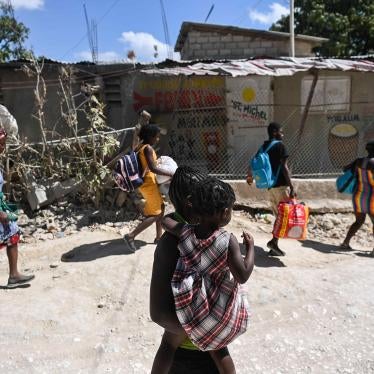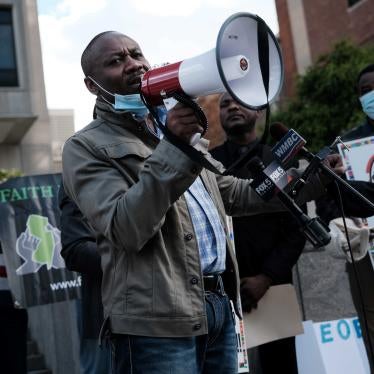January 25, 2024
Thank you, Mr. President, for the opportunity to brief the Council today on the dire human rights and humanitarian crises in Haiti.
This Council took an important step to address the crisis in Haiti last October, by authorizing the multinational security support force and highlighting many dimensions of the crisis that need to be addressed in a holistic way.
Unfortunately, deployment of the force and other critical components of a rights-based response have stalled, and the situation for many Haitians has only worsened.
Killings, kidnappings, sexual violence, and other abuses continue at a staggering rate, with criminal group activities and fighting intensifying and spreading.
Just in 2023, over 4,700 people were killed, doubling the figures reported in 2022, and almost 2,500 others were kidnapped. People we’ve interviewed in Haiti told us repeatedly about how they were struggling to feed their families, their children had constant stomach problems because they didn’t have access to clean water, and they couldn’t access health care or send their children to school.
Over 300,000 people are internally displaced, many of them forced to flee after their homes were burned down and sleeping in open air shelters with little or no humanitarian assistance.
Despite the efforts of leaders from the Caribbean Community, Haiti’s political deadlock persists. There is still no transitional government to meaningfully address the continuing challenges of corruption and complicity of senior political, economic and security actors that allow violent criminal groups to operate. And many Haitians lack access to basic rights and services, which fuels recruitment by criminal groups.
Some of the worst violence in recent months has been in Cité Soleil. A nurse Human Rights Watch interviewed this month, whom I’ll call Sandrine to protect her identity, described how her three-year-old daughter is so traumatized from the incessant gunshots in their Cité Soleil neighborhood in mid-November that she had diarrhea and vomited for three days while their community was under attack.
On the third day, gunmen tried to force their way into Sandrine’s home. Sandrine said that her small child was very aware of what was happening. “She asked me quietly, ‘are they going to kill us?’”
Sandrine said. “I told her that we are not going to die today.” Her daughter said, “If they enter, I will hide under a sheet and not make a sound,” and quietly asked her mother for a cloth so she could cover her mouth and vomit in silence.
Blocked by the barrier outside Sandrine’s home, the assailants eventually left, throwing a Molotov cocktail towards their house.
Two months later, Sandrine said her daughter is still very traumatized and unable to sleep. She holds her mother and says, “they’re hitting the barrier,” and she says to others, “they came to kill my mom.”
Sandrine said this was the worst moment of her life. She also stressed the urgency of an international response. She told us, in her words, “We really need it, as long as they are serious and provide real support, including in places like Cité Soleil. We are suffocating. Haitians are suffocating.”
It is voices like these that the Security Council heard and heeded when it chose to authorize an international force.
We’ve heard a similar sentiment from many Haitians we’ve interviewed. They’re well aware of the failures and abuses associated with past international interventions in Haiti – including widespread allegations of sexual abuse by peacekeepers and the unleashing of a cholera epidemic that killed some 10,000 people – but they also recognize that international support is needed now.
To avoid past failures, the Security Council should call on troop contributing countries and donors to implement a human rights due diligence policy that is at least as rigorous as that the UN applies to its peacekeeping missions.
This includes vetting members of the force before they are deployed and mitigating the risk that the force enables abusive units within the Haitian National Police. Individuals or units who are credibly implicated in serious human rights abuses should be ineligible.
The Council should reiterate zero tolerance for any misconduct by members of the international force and support independent oversight, with the involvement of Haitian civil society groups and impacted communities, to monitor and report on the force’s conduct and performance.
The Council should also support investigation of any allegations of abuse, including sexual exploitation, and ensure appropriate accountability.
But the security component should just be one part of a multi-faceted response to effectively address the human rights and humanitarian crisis in Haiti.
First, there remains an urgent need for well-coordinated humanitarian and development assistance.
Second, the Haitian people deserve a transitional government that can credibly work with international partners to restore security and the rule of law until free and fair elections can be organized.
Third, strong measures should be put in place to ensure justice and accountability for leaders of criminal groups and their backers.
Finally, targeted efforts are needed to curb the illicit flow of weapons and ammunition to criminal groups in Haiti.
We also call on the Council to remind all countries to stop returning Haitians who are fleeing this severe violence.
UN leaders have called for the same and yet, over 216,600 people were returned to Haiti by other governments last year, according to the International Organization for Migration.
The UN has made many mistakes in Haiti. This is an opportunity to get it right, and to support Haitian efforts towards true democratic governance, respect for basic human rights, and to end the deadly cycles of violence and abuse.






